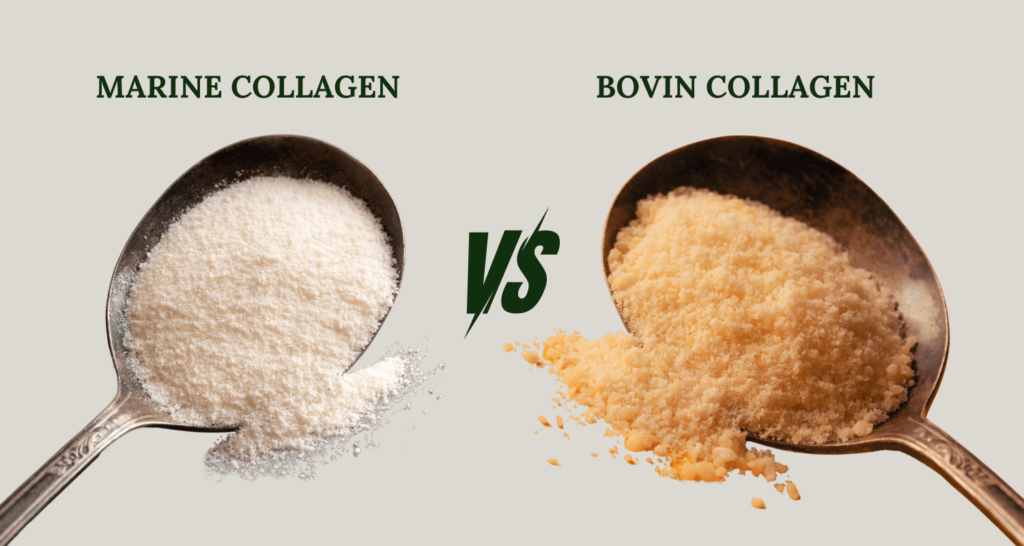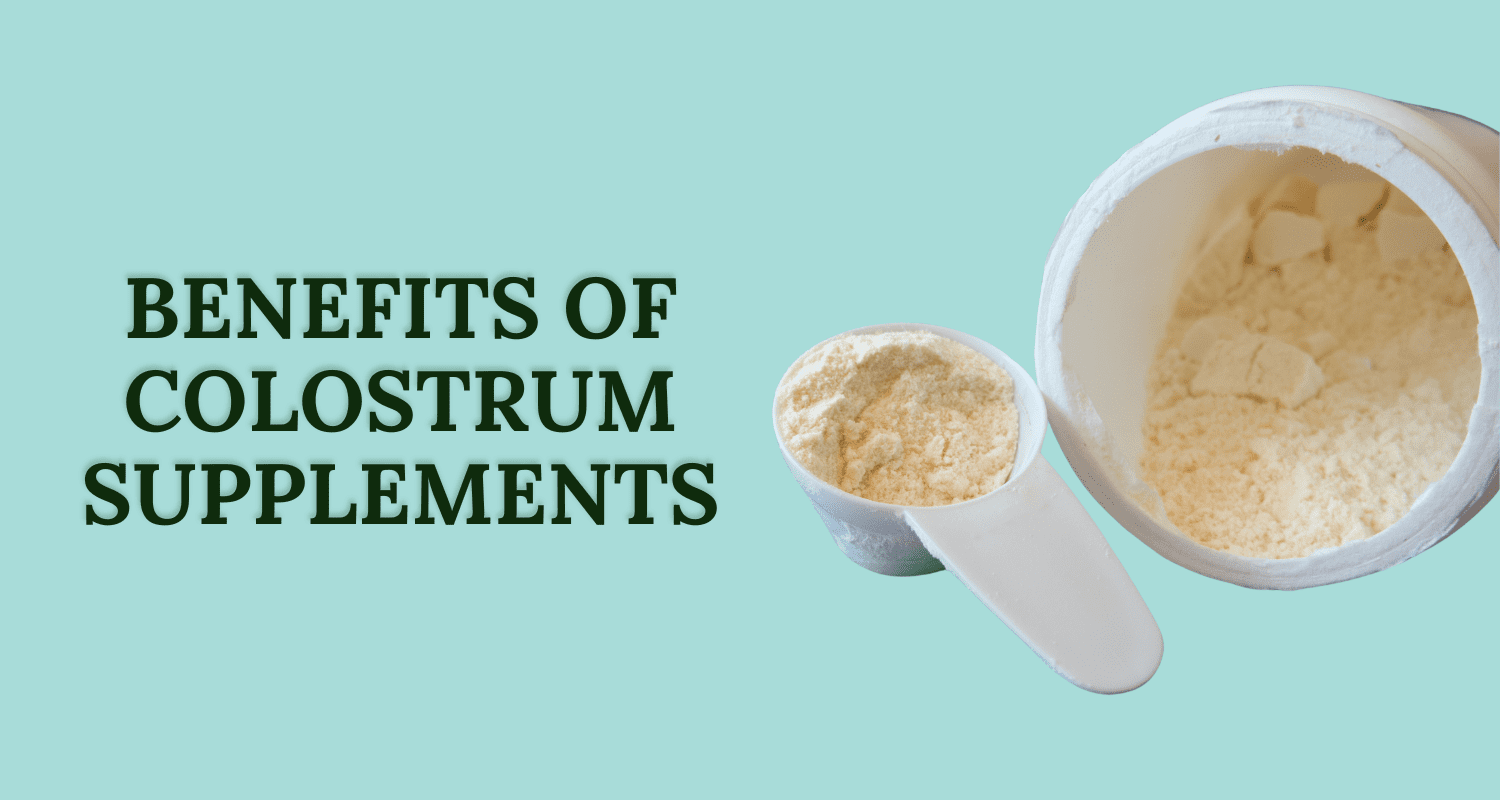Did you know the right collagen can really make a difference? When we talk about collagen, there’s a lot to think about.
In this piece, we’ll look at what sets marine and bovine collagen apart. We’ll dive into marine collagen vs bovine collagen benefits too. This way, you can choose wisely and get the most from your supplement.
Let’s delve into marine collagen vs bovine collagen.
Key Takeaways:
- Marine collagen vs bovine collagen, both types of collagen come from fish and cows, respectively.
- Marine collagen, which is good for the skin, has Type 1 collagen. Bovine collagen has Type 2 collagen, great for joints.
- Marine collagen suits pescatarians and is sustainable, while bovine collagen is budget-friendly for those allergic to shellfish.
- Each has unique perks; your choice should match your health needs and preferences.
Types of Collagen
Collagen is a key protein in our bodies, coming in various types. Each type has unique properties and benefits. Knowing about them helps when picking collagen supplements for our health needs.
Type 1 Collagen
Type 1 collagen is the most common type in our bodies. It keeps skin, hair, and nails healthy and stretchy. It supports structure, boosts skin moisture, and increases natural collagen levels. Supplements with type 1 collagen are chosen for better skin health and less wrinkles.
Type 2 Collagen
Type 2 collagen is mostly in cartilage, helping joints stay healthy and move easily. It keeps joints well-structured and functioning, aiding in movement and easing pain. Those with arthritis or joint issues often use type 2 collagen supplements for relief.
Type 3 Collagen
Type 3 collagen is found in bone marrow, assisting muscles, organs, and arteries. It supports these vital parts and keeps tissues strong. Supplements with type 3 collagen can enhance muscle tone, organ health, and heart wellness.
Knowing the different collagen types helps pick the right supplements for specific health aims. Whether for skin, joints, or overall health, collagen supplements can offer many benefits.
What is Marine Collagen?
Marine collagen comes from fish, like their skin and scales. It’s in many supplements and is ideal for pescatarians or those avoiding beef. This type of collagen, known as Type 1, boosts skin, hair, and nail health.
Its small particle size sets marine collagen apart. This makes it easy for the body to absorb. So, the body can use the peptides well, bringing out the best results. Plus, it’s eco-friendly since it’s made from fish processing leftovers.
Marine collagen is a natural choice for better skin, hair, and nails. Many people choose it to look good and feel great.
Marine Collagen Benefits
Marine collagen is gaining popularity for its health benefits. Many are choosing it to boost their well-being.
- Skin Health: It’s great for skin, increasing collagen in your body. This can lessen wrinkles and sagging, giving you younger-looking skin.
- Gut Health: It’s also good for the stomach. Its small size means the body absorbs it quickly, aiding in gut lining repair. Plus, it has glycine to help calm inflammation, promoting a healthy gut.
- Sleep Enhancement: Moreover, it can improve sleep. The glycine in it encourages relaxation and helps maintain body temperature. This can make your sleep deeper and more restful, enhancing overall sleep patterns.
Adding marine collagen to your routine has clear benefits. It can make your skin look better, improve your gut health, and help you sleep well.
What is Bovine Collagen?
Bovine collagen, also known as beef collagen, comes from cow hides. Specifically, it’s from their connective tissues. You can find it in forms like powders, tablets, and liquids.
This type of collagen is special because it has both Type 1 and Type 2 collagen. Type 1 helps with joint health. Type 2 is great for muscle recovery. So, bovine collagen is excellent for both joint support and muscle repair.
Besides collagen, this kind has important amino acids like glycine and proline. These amino acids help with joint repair, muscle growth, and keeping your heart healthy.
Another good thing about bovine collagen is that it’s more budget-friendly than other types. It’s a cheaper way for people to add collagen to their diets.
Also, bovine collagen is a good choice for individuals with shellfish allergies. Unlike marine collagen, which comes from the sea, bovine collagen offers a safe alternative for them.
Bovine Collagen Benefits
Bovine collagen has many benefits that improve health and well-being.
Improved Joint Health
Bovine collagen supports joint health well. It boosts cartilage production and eases pain and stiffness. This keeps joints working smoothly and is great for people with joint issues.
Enhanced Gut Health
Bovine collagen is key for good gut health. It repairs the gut lining and eases leaky gut and digestive problems. A healthy gut means better digestion and nutrient use.
Enhanced Sleep Quality
Bovine collagen may also help you sleep better. Its glycine helps control your sleep cycle for a restful night. This is good news for those who find sleeping hard.
Bovine collagen is also more affordable than marine collagen. This makes it a good choice for many people. It’s easy to find and use every day.
Think about your needs and goals when choosing collagen. Bovine collagen improves joint and gut health and sleep quality. It’s a great way to boost your overall well-being.
Comparison of Marine Collagen vs Bovine Collagen
When we look at the difference between marine collagen and bovine collagen, there’s a lot to think about. Marine collagen vs bovine collagen each kind has its own set of perks. They cater to different tastes and health requirements.
Marine Collagen
- Preferred option for pescatarians and individuals with shellfish allergies
- Derived from fish sources, specifically the skin and scales
- More bioavailable and easily absorbed by the body
- Rich in Type 1 collagen, which is known for its skin-enhancing benefits
Bovine Collagen
- Cost-effective option
- Suitable for individuals with beef allergies
- Derived from cow hides, specifically the connective tissues
- Contains Type 2 collagen, which supports joint health
The choice between marine and bovine collagen really depends on what you need and want. If you’re a pescatarian or allergic to shellfish, marine collagen is a great pick. It’s good for the environment and great for the skin.
Looking for something easy on the wallet that helps your joints? Then bovine collagen could be the right fit. Think about what you eat, your health targets, and how much you want to spend. This will help you choose.
Conclusion
Marine collagen vs bovine collagen, both provide unique perks for health. Marine collagen, from fish, is perfect for those wanting better skin. It boosts skin health, strengthens hair, and helps nails grow. This type is easy for the body to absorb.
Bovine collagen is ideal for improving joint and gut health. It helps make cartilage, eases joint pain, and helps muscles recover. It also has amino acids that aid in joint repair and muscle growth.
The better choice depends on your health goals and diet. Think about what benefits you want and issues like sustainability. Both types of collagen are good for health, whether you care more about skin or joints.
FAQs
What is the difference between marine collagen vs bovine collagen?
Marine collagen is sourced from fish, making it suitable for pescatarians. Bovine collagen comes from cows. Both types offer similar benefits for skin, hair, and joints.
Which is better marine collagen or bovine collagen?
The choice depends on dietary preferences. Marine collagen is great for those avoiding beef, while bovine collagen is suitable for most people.
Which form of collagen is most effective?
Both marine and bovine collagen are effective. The key is choosing a high-quality, bioavailable source that suits your lifestyle.
Can I take both marine and bovine collagen?
Yes, combining different collagen types can provide a broader spectrum of amino acids, potentially enhancing benefits for skin, joints, and gut health.
Is Type 1 Marine collagen the best?
Type 1 marine collagen is excellent for skin health due to its molecular structure, but the “best” type depends on individual health needs and goals.
Disclaimer: This content, including advice, provides generic information only. It is not a substitute for a qualified medical opinion. Always consult a specialist or your doctor for more information. Nutrition Cult does not claim responsibility for this information.




